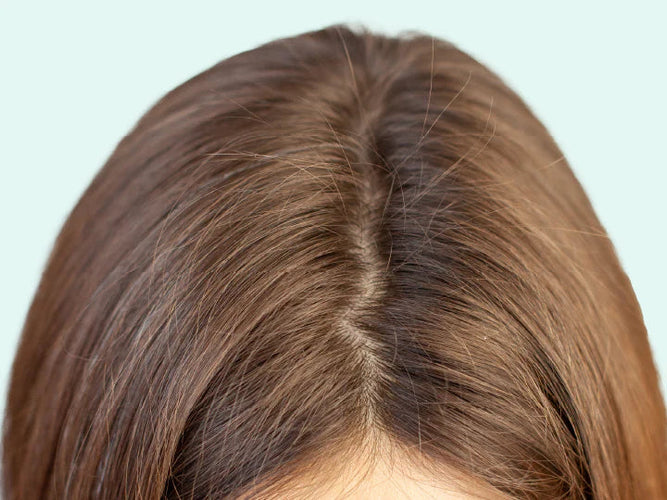A dry scalp can happen to anyone. It can make you feel self-conscious and cause discomfort. For example, you may notice ‘snow on your shoulders or experience intense itching. You might also mistake a dry scalp for dandruff. In this blog post, we explain the causes of dry scalp, the common mistakes you should avoid, and what can help to restore your scalp to a healthy condition.
What is a dry scalp?
A dry scalp is a condition in which the skin on your head does not hold enough moisture. This can irritate the scalp and cause flaking, itching and a tight feeling. The cause is often related to internal factors, such as stress or hormones or medication. It can also be due to your routine, for instance showering with water that’s too hot. Or using a shampoo with the wrong pH. The good news: in most cases you can improve it with gentle products, healthy habits and proper care.
How to recognise a dry scalp?

How to tell the difference between dry scalp and dandruff.
Dry scalp and dandruff can look similar, so it is sometimes hard to identify which one you have. However, there are clear differences between them:
With a dry scalp, lack of moisture is usually the cause. The scalp becomes irritated and dehydrated, often leading to small, white flakes that fall easily from the hair. Dandruff is characterised by fine, loosely adherent white or grey flakes that appear either across the scalp or in localised patches on hair-bearing areas. Symptoms such as itchiness, irritation and scalp tightness may also occure.
It is important to know whether you have dandruff or a dry scalp so you can choose the right products. Look closely at the colour, size, and texture of the flakes, and note how oily or dry your scalp feels.
Tip: if you also have dry skin elsewhere and the flakes are exceptionally fine and white, you most likely have a dry scalp rather than dandruff.

What causes a dry scalp?
A dry scalp rarely has just one clear cause. Several things often play a role, so it is usually a combination of factors. The causes can be divided into two groups: internal and external.
Internal causes
- Your skin is naturally drier (for example due to genetics or age). As you get older, your skin produces less sebum, so your scalp dries out more quickly.
- Hormonal changes, for example during puberty, menopause or pregnancy, can affect your scalp.
- You have a skin condition such as eczema or psoriasis.
- You are experiencing a lot of stress, which can throw your scalp off balance.
- Some medication can affect your skin condition
- You may have some nutritional deficiency
External causes
- You wash your hair too often or with hot water (or both).
- You may have sensitive skin or a sensitive scalp. Your scalp can become irritated by a specific ingredient in a shampoo, hair dye or styling product.
- You use shampoos with irritating ingredients such as alcohol or sulphates, which you may not tolerate well.
- You blow-dry, colour or style your hair too often.
- The weather is cold or dry, or the heating is on frequently — your scalp doesn’t like that.
- You eat unhealthily or drink too little water
Smoking can also negatively affect your overall skin condition, including your scalp. By looking closely at your care routine, lifestyle, and environment, you can better understand why your scalp is dry.
Common mistakes (that make it worse)
Sometimes, without realising it, you make mistakes in caring for your scalp. These can make your scalp drier. But knowledge is key! We are happy to share the most common mistakes:
-
You wash your hair too often
Washing your hair daily (especially with hot water) can strip away the scalp’s natural oils. The natural oils help protect your scalp from drying out. Our tip? Try washing your hair less often and find a routine that works for your scalp’s health.
-
You use harsh shampoos
When washing your hair, it is also important to consider the shampoo you use. A shampoo containing sulphates (SLS), alcohol and fragrance can irritate and dry out the scalp. These ingredients effectively strip the scalp’s natural oils and can also disrupt its pH level. Choose a proper shampoo or one specifically formulated for your scalp type, such as the Neofollics Scalp Therapy Exfoliating Shampoo.
-
Styling your hair with heat
Do you often use a hairdryer, straighteners or curling tongs? Heat can damage both your hair and scalp, especially if you do it too often and without heat protection. Try to style your hair without heat more often and always use a heat-protectant product.
-
Using too many styling products
Love your styling products? See if you can use a little less. Overusing dry shampoos, gels or hairspray can irritate and dry out the scalp. Product residue can also clog pores. Use these products in moderation and rinse them out thoroughly when you wash your hair.
-
Scratching or brushing too hard
When you feel itchy, it is tempting to scratch, but this can cause tiny wounds and further irritate your scalp. Brushing too hard can also lift flakes and worsen irritation.
Is there a link between a dry scalp and hair loss?
A dry scalp on its own does not cause permanent hair loss. Your hair follicles do not suddenly become damaged just because your scalp is dry. There can, however, be an indirect connection. Dryness can cause itching, which may make you scratch your scalp. This can break and irritate the skin, and may even affect the hair follicles. An unbalanced scalp environment can influence hair health. Scratching, irritation and the inflammation that follows can affect the scalp’s condition, rather than the dryness itself.
Underlying skin conditions can also cause both dryness and hair loss, such as severe dandruff or scalp psoriasis. These can trigger enough inflammation for hair to shed temporarily. In most cases this hair loss is temporary. Once your scalp is balanced and healthy again, it provides a better environment for your hair. By treating a dry, itchy scalp, you also help keep your hair healthy.
What can you do for a dry scalp?
A dry scalp is uncomfortable. Fortunately, there are things you can do yourself to relieve and restore it. Try these practical tips and treatments:
-
Use a gentle, hydrating shampoo
Switch to a mild shampoo without harsh ingredients such as sulphates. The Neofollics Scalp Therapy Exfoliating Shampoo removes flakes gently without drying out the skin. Tip: gently massage the shampoo in with your fingertips or use a soft massage brush such as the Neofollics Scalp Massaging Shampoo Brush. This helps stimulate blood flow.
-
Wash your hair less often and with lukewarm water
Avoid washing your hair every day; aim for 2 to 3 times per week so the scalp’s natural protective oils are better preserved. Use lukewarm water rather than hot to prevent further dryness. After washing, you can use a leave-in mask, such as the Neofollics Scalp Therapy Nourishing Mask. This product is nourishing and soothes the scalp.
-
Soothe itching gently
Got an itchy scalp? As hard as it is, try not to scratch, as this can damage the skin. Instead, massage gently with your fingertips, this can also help stimulate natural oil production. If you have severe itching due to a skin condition, speak to your doctor.
-
Protect your scalp from external factors
Weather can affect your scalp. A few tips: place a humidifier in your home during winter to reduce dryness in the air. Wear a hat in wintry weather. In strong sun, wear a cap or hat to prevent your scalp from drying out further or being damaged by UV radiation.
When should you see a dermatologist?
If your scalp remains dry and irritated despite the tips above, it is wise to consult your general practitioner or a dermatologist. You may have a skin condition that requires medical treatment.
Note: these tips do not replace medical advice. For severe or persistent symptoms, professional care is important.
Frequently Asked Questions
How can you prevent a dry scalp?
You can help prevent a dry scalp with gentle care and healthy habits. Avoid washing your hair too often and use lukewarm water. Choose a mild shampoo without harsh ingredients. Stay clear of drying factors, such as dry environment in winter or strong sun in summer. Eat a balanced diet, drink enough water, and be mindful of the hair products you use. Avoid heavy styling products and opt for hydrating, natural ingredients.
Can a dry scalp go away on its own?
A mild dry scalp can sometimes improve by itself, for example, if the dryness is caused by temporary wintry weather, stress, or using the wrong hair product. Once the cause is removed, the skin often recovers gradually. However, a dry scalp usually will not resolve on its own if you do not change your routine. If you wash too often or use a harsh shampoo, the scalp will keep drying out. That is why it is important to switch to gentle products and a caring routine.
How often should you wash your hair?
This depends very much on your scalp health and sebum production. Daily washing is not necessary and can make the scalp drier because it removes the natural oils. Try to avoid doing that.
Always use a mild shampoo and listen to your scalp. Does it feel tight or sensitive? Then you are washing your hair too often.
Recommended products
Would you like to improve the condition of your scalp? Then try the Healthy Scalp treatment. This treatment includes a serum, shampoo and mask.
Discover the Healthy Scalp treatment for yourself
Conclusion
A dry scalp is uncomfortable, but usually easy to resolve once you know the cause. It is often a combination of factors, such as washing your hair too often, using harsh shampoos, heat from styling tools, cold or dry weather, or a lack of key nutrients. By using gentle, hydrating products, washing less frequently, choosing lukewarm water, and protecting your scalp from the sun and cold, it can help recover and feel healthy again.
Pay close attention to signs such as persistent itching, redness, flakes that do not go away, or temporary hair shedding. If symptoms last longer than a few weeks or get worse, it is wise to consult your general practitioner or a dermatologist. This can help identify any underlying skin condition and ensure you receive the right treatment.
With the right care, a healthy lifestyle and protection, your scalp will usually feel comfortable again quite quickly. Products such as the Neofollics Scalp Therapy Exfoliating Shampoo & the Neofollics Scalp Therapy Nourishing Mask can help cleanse, nourish and soothe the skin gently.
Sources
Watson, S. (2024). Is it dandruff or dry scalp? Symptoms, treatment, and more. Healthline.
Medical News Today. (2022). Is an itchy scalp linked with hair loss?
This information does not replace professional medical advice. If in doubt, always consult a doctor or specialist.













